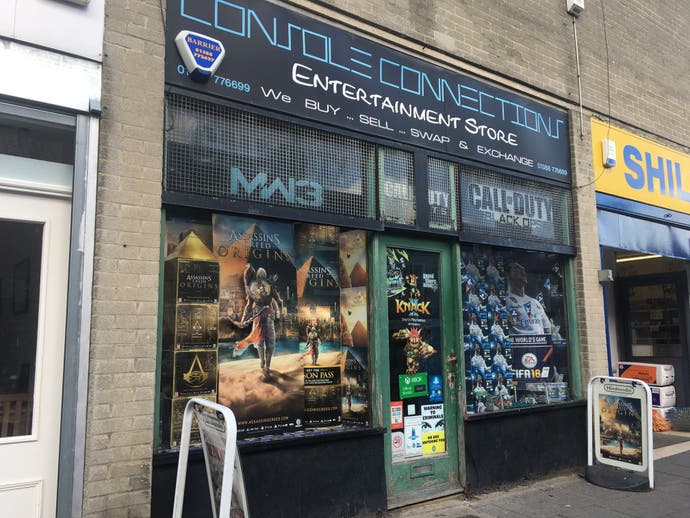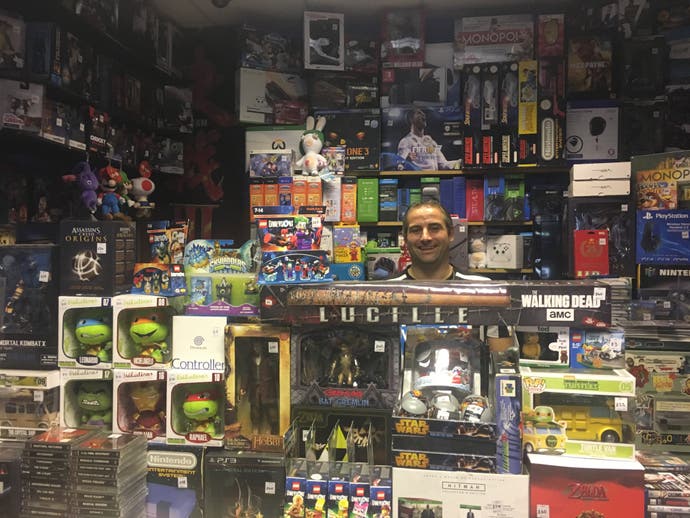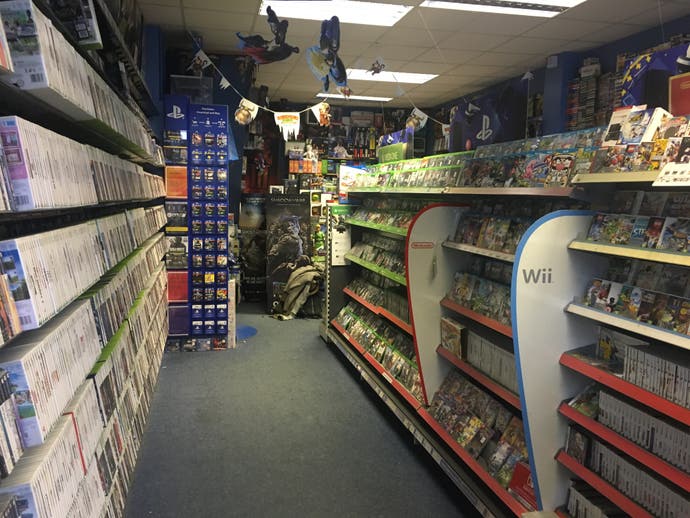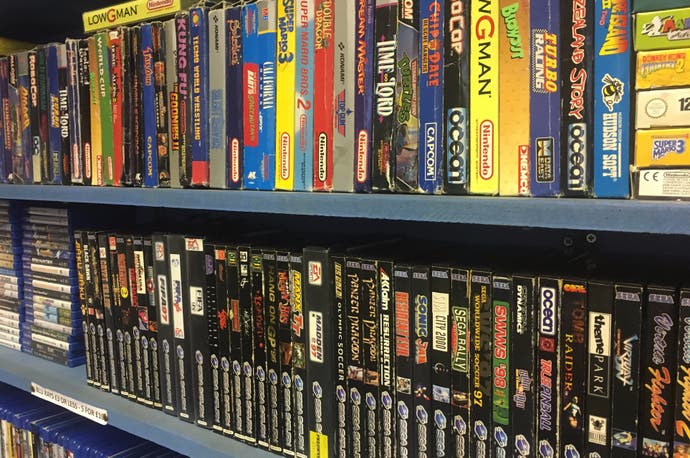A day in the life of an independent video game store
'We're the driving force for the everyday gamer.'
Places like this are too few and far between. Step into Console Connections in Shildon, County Durham, and it's like walking into an Aladdin's cave of games. Boxes reach up to the ceiling along every wall, and seemingly every console from the past four decades is represented in some way; from the PS4 display by the door to a boxed Amstrad GX4000 sitting proudly on the counter. Why can't all game stores be like this?
For owner Chris Bowman, Console Connections is the culmination of a lifetime's passion. The store opened in 1996, but its origins go back much further than that. "I had my first shop when I was 13," says Bowman. "There was a swap shop in the next town along, and I used to swap all my games, and I thought: 'well, there's money to be made in that'. And then I started doing markets and car boot fairs, and it sort of snowballed from there."
When he was part way through college, Bowman decided to follow his dream of swapping the car boot sales for a bricks and mortar store of his own. He ditched his studies and started Console Connections.
"We've been through a lot," says Bowman, listing the launches of the N64, Dreamcast, Xbox, PS4. "But now the high street has totally changed. All your retailers seem to be disappearing, there's less independent stores."
Places like this are few and far between because the reality facing independent stores is a tough one. They face numerous threats, from the rise of digital downloads, online retailers and games as a service to the possibility of the second-hand market being snuffed out by corporate control. "Microsoft tried it last time round, which I think was a shot in the foot really," says Bowman, referencing the console giant's original plans to charge users to play second-hand games. "If they try it again, going all digital, we're finished. Finished."
He knows many of his customers by name, and they often pop in for lengthy chats about gaming - while we're talking, one of the regulars stops by to check whether there are any new games out today.

Around a dozen or so customers potter in over the lunchtime period, most of them regulars along with a couple of mums who seek advice on what games to buy for their children. Bowman gestures to one couple after they leave with their purchase of two cheap PS2 games. "I know for a fact that when they moved here they were asking where the nearest food bank was." Shildon is a poor town with a proud history - it was the location for the world's first public steam railway. But nowadays it's blighted by high unemployment. "I remember they once found £10 that someone had dropped over there," says Chris, pointing to the corner of the shop. "They handed it in to me. After a couple of weeks, no one had claimed it, so I gave it to them. They spent it straight away on games."
Bowman sees the shop as providing a vital point of connection in the local community: "We're the driving force for the everyday gamer. They don't go in the supermarkets and have a chat with someone on the tills about the new games. They come to places like this."
But with the rise of digital games and online retailing, every year it's getting more difficult for Console Connections to survive. "It's hard," says Bowman. "Online is hard. It used to be supermarkets, where they'd drop the price and you couldn't compete. You're selling FIFA for £45 and they're doing it for £35. But now it's online." I ask him whether he sells games online himself. "I don't do any online, which surprises a lot of people. I run it all myself, so literally I'm in every day of the week. And it's a case of, like, if I'm busy with the shop, I'm busy with the shop. I don't have time to pack, post and do all the other side of it." He adds that it's probably too late to enter that market anyway: "Unless you got in there back in 2000, 2005, whatever, you've got no chance of finding your feet online."
Retro gaming is one area in which Console Connections can stand out, and Bowman says that this section of his business has been growing consistently, helped by the fact that prices stay relatively stable. "If you buy retro, you can't lose money on it. It will continue to increase or stay the same value." But even here he's seen increased online competition. "Of late we've had CEX jump on the [retro] bandwagon. They've started posting stuff online, cash, trade, everything else. We don't carry the diverse amount of stock that a national chain does. You just feel like you're getting squeezed all the time."
One subject that we return to again and again is the astonishingly small profit margins on new games. Whereas national chains can strike favourable deals with distributors by buying in bulk, Bowman can only buy handfuls of games at a time and consequently pays a higher wholesale price - to the point where he's sometimes only making a marginal amount of money on the sale of a new game. Even worse, new games can plummet in price alarmingly quickly, which means there's a high risk he could make a loss if he can't sell all of the copies immediately. Consequently, he usually only orders enough copies to fulfil preorders as well as "a couple over the top for walk-ins".

This has led to some bizarre situations where sometimes it would be cheaper for Chris to order a new game from an online retailer than it would be to buy it from his wholesaler. "It's tempting," he says, but even so he always buys through wholesale because of the guarantee of stock on day one. He knows people who've gone down the 'grey' route and have ended up regretting it when the stock doesn't arrive for release day. "There's some horror stories where people have gone grey and then don't have the games for release. How do you fill that void? How do you relate that back to your customers, and say 'I don't have your game, I know it's out today, but it's coming tomorrow'. As soon as you don't deliver, customers are going to go elsewhere."
Considering the razor-thin margins on new games, I ask whether it's worth it to get them in at all. "You have to get the new games to get the second-hand games in," he replies. "It's a vicious circle. It's hard."
As well as increased competition, the notion of games as a service is eating into sales. "You sell FIFA, Call of Duty, whatever - they'll buy that one game and it'll last them a year. Going back to 2000 or whatever, you'd buy that game, and once you're sick of it, you trade it in. Now we've got the added value of DLC, extra content and everything else, which has increased the longevity of these games." And he notes that selling digital codes for things like FIFA's Ultimate Team can in no way offset the impact of lower games sales: "The profit margins on digital codes... you can't run a shop on just selling digital codes, unless you're selling thousands and thousands. Five per cent mark-up's just not enough."
Even getting hold of hardware to sell is a struggle for independent retailers, as big chains and supermarkets snaffle up the limited stock. Bowman recalls that at around the launch of the Xbox One "we saw piles of Xbox Ones in supermarkets, and we couldn't get any. Literally it took a couple of months after the release date before we got Xbox Ones through the door."
Console Connections' troubles are compounded by the fact that recent years have seen a dramatic drop in footfall on the high street. With a population of just under 10,000, Shildon is small enough as it is. But to make matters worse, a large out-of-town shopping centre opened recently outside nearby Bishop Auckland. "It's sucked the life out of two towns," Bowman laments. He attributes the closure of the Morrisons supermarket in Shildon to competition from the new development, and recent years have also seen the closure of the town's banks. "There's a lot of empty buildings now. People don't have a reason to walk up the street. I've got loyal customers who've always shopped here and probably always will, but you've got a lot of people who'd maybe walk past and just nip in. And now..."

Bowman is well aware of the need to diversify in an attempt to offset falling game sales. It's something he's attempted several times in the past: "We used to sell CDs, but now everyone streams, downloads. Everyone's starting to download. We've moved into toys, Lego, bits and pieces. The retro does really well, but it's hard to drag people into your town just for retro." I ask him whether he's thought about what to do if game sales continue to fall. "Get-out plan? Probably sell the premises, pay the mortgage off, get a 9-to-5."
It's a sad admission, and I can tell that just thinking about the notion of giving up is difficult for him, chucking in a business he has grown from scratch over more than 20 years. He says he's considered relocating to Durham, and perhaps concentrating more on retro, but really the sums don't add up. He adds that he might end up ditching the shop and just selling retro games online.
But it won't be the same.
"I know there are a few stores that are probably going to go," Bowman says, as he looks towards a fairly bleak future for independent game shops. "It's awful, especially when you've been doing it as long as we have. It's nothing that they've done wrong, it's just that people's shopping habits have changed. It's hard out there, it really is. Margins are tight, new releases aren't turning over as quick as they used to be. It's not looking good."
The idea that a shop as unique and wonderful as Console Collections might not be here in a few years' time is a difficult concept to swallow. There aren't enough places like this already, and I can't bear to think that one day soon there might be even fewer. There's a magic to places like this that can't be matched elsewhere, and deserves to be kept alive.
You can find Console Connections in Shildon, and visit its site here. Support your local independent games store!

